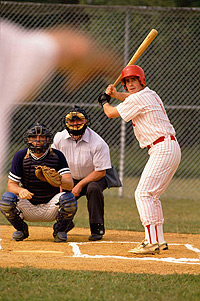 Baseball spring training typically takes place in March, with the season running between early April and late September. I have yet to see sports
organizations, sporting goods stores, or local events take advantage of lower-priced keyword or optimized terms related to the sport to drive local in-store sales. Maybe Google and Bing need to
rewrite the rules when it comes to paidsearch ads related to information vs purchase intent.
Baseball spring training typically takes place in March, with the season running between early April and late September. I have yet to see sports
organizations, sporting goods stores, or local events take advantage of lower-priced keyword or optimized terms related to the sport to drive local in-store sales. Maybe Google and Bing need to
rewrite the rules when it comes to paidsearch ads related to information vs purchase intent.
If the future of online marketing ties real-life events into nimble campaigns, Google needs to
rethink its policies and practices on commercial-intent paid-search ads. I found it a bit odd that when searching on the keywords like "baseball spring training," ads don't serve up for retail stores
Sports Authority, Big 5, Dick's Sporting Goods, and Sports Chalet. And what about sports bars like House of Brews, or OC Sports Grill?
It turns out that ads don't serve up on many
non-commercial searches. It presents challenges that can drop a brand's quality score if it doesn't produce. Google views the term "baseball spring training" as a search for information, rather than
someone looking to make a purchase. What a lost opportunity for both Google and merchants, especially because the engine touts serving up information on subjects the consumer didn't know he/she
wants.
It's difficult for advertisers to have their paid-search ads serve up based on informational and navigational queries, according to WordStream CTO Larry Kim. These terms tend to produce
lower click-through rates (CTRs). Reduced competition allows the brand to bid less on the terms, but the ads still need to maintain click-through rates between 5% and 10% or 20% if there's no
competition. Sometimes a low CTR shuts off the advertisement, he said.
David Levy worked at a sporting goods store prior to becoming partner at agency WSI Digital Marketing. He said the
company would always associate a small subset of keywords to drive online to offline in stores. "We had a paid-search agency managing campaigns and asked them always to keep track of all the major
sporting events," he said. "We would figure out the keyword campaigns based on the live events."
Levy brought the conversation back to Kim's argument pointing toward searches based on
information vs. purchase intent, in which I said maybe cheap flights to Orlando, Fla. would convince me to purchase the tickets to see spring training in person. So where's the American Airline flight
information?
There's also a missed opportunity for sports bars and restaurants in searches on mobile devices. Retail & Restaurants was the number one vertical on the Top 10 Global Brand
Verticals on the Millennial Media platform in 2012, growing 106% year-over-year, according to a report from Millennial Media. This sector made up 16% of the total brand advertiser campaigns last
year.
Last year, site traffic made up 14% of all advertisers' campaign goals, with automakers heavily using the "learn more" or "site search" functions in campaigns to drive consumers to their
Web pages -- something sports brands should consider for both organic and paid-search campaigns.